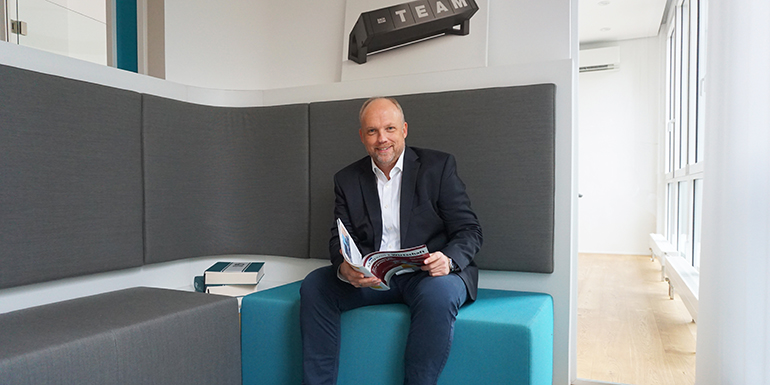
Hans-Peter Wulf, Head of Global Sales and Marketing as well as member of the Management Board, on change, internationalization and the question of getting along with hundreds of mails a day.
Hans-Peter, in addition to Head of Global Sales, you are now also Head of Marketing and part of the Management Board. What will change under your leadership?
A lot of what counts for me is already set as a topic today and has already been initiated in the past. Now we have to continue along certain paths. Terms like customer centricity are already circulating. However, I would like to see the company take really big steps in this direction now. We have to make the principle of customer centricity our guiding light.
As far as marketing is concerned, I would like to dovetail the unit much more closely with sales. Both units should be perfectly aligned. If Sales and Marketing are a powerful duo, it makes a huge difference to a company.
For the Sales Unit, I would like to see even greater harmonization between generalists and specialists, i.e. between floor space and channel management. In addition, we at BACHMANN see ourselves as a premium supplier. We want to strengthen this identity in the long term.
What role does internationalization play for you?
As a group, we have undergone major changes in recent years and developed further in many areas. Building on a clearly defined strategy, we are now operating in a much more focused manner and now have a well-structured basis that will enable us as a group to achieve above-average growth in the future. Important to the growth will be the European markets.
We want to double our current annual sales in the next five years. This is a goal towards which we are all moving together. Since we've spent a lot of time thinking about our own structures over the last few years, we're now ready to go full speed.
I don't know many people who are both a Marketeer and a Sales Expert. How did your enthusiasm and experience for both worlds come about?
It honestly started in college. I had a sales-related course of study, but the curriculum included numerous marketing topics. I could identify with that very well. However, even during my first work experience, I had the feeling that the functionality of this constellation was underestimated. It quickly became clear to me that only when both areas combine their perspectives on the market can truly strong brands emerge.
During my time at Gaggenau Hausgeräte, I was able to experience exactly that: Both departments worked in constant relation to each other. At important customer meetings, Marketing was often there as well as Sales, and that worked fantastically. Today I can say that I would like to see a structurally similar constellation of both units at BACHMANN. I am very pleased that I can now make my contribution, also through my role as Managing Director, to bring the two areas even closer together.
What other topics are close to your heart?
I don't think the topic of mindset can be emphasized enough. Nevertheless, it unfortunately often remains too abstract a concept, which often doesn't seem to be very easy to integrate into our everyday lives. But I am sure that this is the key to success.
To explain this using the example of our heartfelt topic of Customer Centricity: If you get up in the morning and make it your personal goal to make customers happy today, you change your entire way of working and also fill your personal energy store with lots of positive energy.
A nice quote from Herb Kelleher, an American businessman and co-founder of SouthWest Airlines, comes to mind. He once said "I tell my employees all the time that we're in the service industry and it's pure coincidence that we also fly airplanes." This is a great example of how important mindset - also and especially in the case of Customer Centricity - is for colleagues.
Hans-Peter, your life hack for dealing and coping with the daily flood of mail?
An important question! Before I answer it, I have to note: I have my colleague Kathrin who supports me excellently in this, so fortunately I am not alone with this task.
However, I have to admit: It is often a challenge. To overcome it, I rely on clear focus time slots (e.g., rescheduling meetings to car trips), on consistent work-from-anywhere, i.e., processing mails in between, and on integrating small time-outs into the daily routine, if the situation allows. This includes deliberate breaks as well as deliberate offline times. This kind of distance is important to maintain mindfulness towards yourself and your own energy level.
And at the end of the day, I also try to confront my pronounced time optimism with reality: There are only 24 hours in a day, so it's just not possible to get everything done right away. When you say goodbye to this claim, you immediately see things in a much more relaxed way!
Hans-Peter, thank you very much for the interview!